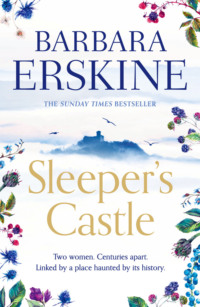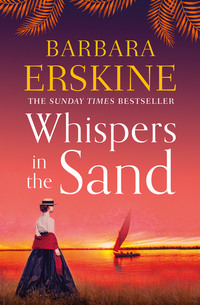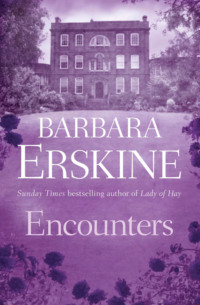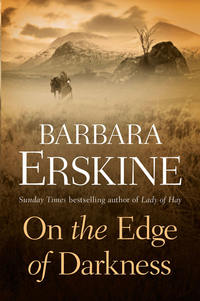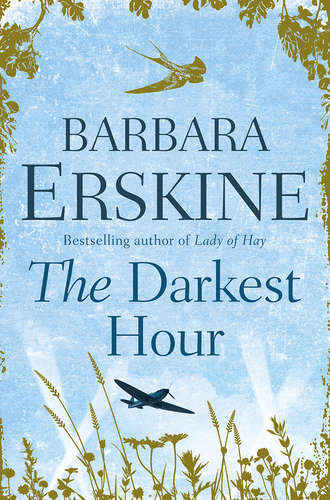
Полная версия
The Darkest Hour
‘I need to get back,’ he said suddenly. He bent and kissed his sister on the top of her head. ‘Don’t worry the parents. I’ll see them tomorrow, God willing.’ He grinned. They had both had the same thought. A beautiful peaceful afternoon. It was too good to last. It was only a question of time before the distant drone of engines heralded the next wave of enemy aircraft appearing from the south.
28th June, late afternoon
Michael Marston was in a thoughtful mood when Charlotte Ponsonby arrived at Rosebank Cottage. Her sudden phone call the night before, when she found she had two unexpected days off, and his spontaneous agreement to stay at Rosebank so they could spend them together was the reason he had thrown Dolly and therefore Lucy into disarray. After their initial hug Charlotte followed him through the house and out into the garden.
‘So, are you going to tell me who your visitor was?’
He roused himself from his reverie. ‘Who?’
‘The woman I saw leaving here not ten minutes ago.’
‘Oh, her.’
She narrowed her eyes. ‘Yes, her. Who was she, Mike?’ She herself was as far as she knew Mike’s only girlfriend, his official partner to dates and parties, included automatically by his friends in conversation and future plans, but still she felt insecure; there was a reserve on Mike’s side which she couldn’t quite work out. Was it his natural way with women or was it just her? Was he as yet undecided? Had he in his own mind still to make a commitment? His next question did not reassure her.
‘Why so interested?’
‘Because I am.’
‘Jealous?’
‘No! Of course not. Hardly.’ She gave a little snort as she tossed her head. Her hair swung in a glossy curtain round her face and for a moment hid her expression. She had narrow intense eyes and sharp features which were undeniably beautiful in their bone structure but her face held a certain hardness of which she was acutely conscious. It made her smile too much.
‘Actually, she is quite attractive, if you like that sort of thing.’ Mike grinned as he lowered himself onto the rustic seat on the lawn and held out his hand to pull her down beside him. ‘She is an interesting person. Her husband was killed in a car crash three months ago.’ He paused, frowning slightly, wondering how on earth anyone could possibly cope with something like that. ‘She wants to write a book about Evie.’
There was a long silence.
‘And is that good?’ She surveyed his face carefully.
‘I don’t know.’ He sat forward on the bench, his hands hanging loosely between his knees. He closed his eyes against the sunlight and sighed, leaning back at last against the rough lichen-covered bench back.
‘Well, she is really famous, isn’t she? I am surprised no one has done it before,’ Charlotte said cautiously.
‘I suppose it was bound to happen one day. But she was always reluctant to talk about the past. I remember my parents saying they knew so little, even Pops, for goodness’ sake. Broad brushstrokes, that’s all.’ Mike gave a snort of laughter at his choice of words.
Charlotte smiled. She kicked off her wedge-heeled sandals and leaned into him. ‘We’re a couple of idiots sitting here in our office uniform,’ she whispered. ‘Shall we go and slip into something more comfortable?’
He didn’t answer for a moment. She gave him a sideways glance, wondering if he’d heard what she said.
‘If she starts poking round we won’t be able to stop her,’ he said eventually. ‘There is no knowing what can of worms she might dig up.’
‘Why should there be a can of worms?’ Charlotte was getting tired of this conversation already. She jumped to her feet and reached for his hand. ‘In fact, surely the more worms the better. It would make it all more exciting. Make her pictures more valuable.’
He looked up at her. He liked her hair free of the severe knot in which she kept it restrained during the working day. ‘OK. I’m coming.’ Reluctantly he stood up and allowed himself to be towed back towards the cottage.
Upstairs she looked round the small bedroom with its quaint windows and chintz curtains. Rosebank needed a clean blast of modernity and a damn good builder. There wasn’t even a shower, for God’s sake. She could hear the bath running and the slam of cupboards. Mike always forgot where he had put the bath gel; and everything else, for that matter. The trouble with this place was that it was nothing more than a weekend cottage. It was inconvenient, small and uncomfortable. It needed a clean sweep and then a designer with a good eye for modern comforts. With a clever conversion and a large extension it would make a nice home.
She hadn’t known Mike that long and their relationship was mostly based in London where his garden flat in Bloomsbury met her every criterion of comfort and convenience, but there was a small part of her which was beginning to think about a future with him which was definitely longer term than any other she had so far experienced. Which brought her back to her niggling worry about the depth of his feelings for her. Had he ever thought about marriage? They had never discussed it, but supposing, just supposing they tied the knot, what then?
Mike was an advertising executive in a medium-sized but well regarded company with a broad portfolio of accounts. He was clever and attractive, confident and talented but in some areas of his life he was reserved. He enjoyed his own company and although he clearly enjoyed hers she wondered sometimes if he was one hundred per cent dedicated to her; or for that matter to his job and to London. She returned to her reverie about the future. Commuting was out of the question, it was from her point of view just too far, but once there were children she for one would be more than happy to spend at least part of each week in the country. Husband in town; wife in the country. Recipe for disaster, she knew that. But a garden, a local playgroup, good schools. It would make sense. It was a lifestyle some of her friends were opting for and she had to admit she was beguiled.
She tiptoed over to the large chest of drawers which dominated the room, perched as it was incongruously on the uneven floorboards, and she pulled open the top drawer. Surprise! It was stuffed full of dusty books. It was years since Evie Lucas had died and the house was still full of her stuff like some goddamn shrine. Well, now there was a solution. She pictured her brief meeting in the lane with Mike’s afternoon visitor. A tall slim woman, slightly sallow of complexion with dark straight hair; good features, large eyes – Charlotte always noticed other women’s eyes – beautiful even, but not his type. Why not let her sort all this mess out?
When she and Mike had first met and she had realised he had a famous grandmother with a painting in the Tate Gallery Charlotte had excitedly imagined a house full of paintings worth millions. When, wide-eyed, she had said as much to Mike he had roared with laughter. ‘If it was true I’d be a rich man! Sadly there are no paintings left. God knows where they all went. I suspect Evie sold some. I assume she was quite hard up in her old age. That often happened, didn’t it? Artists were poor in their lifetime; only later was their stuff valuable. And to be honest I don’t think she has ever been that popular as a painter. The others, the ones in the cottage, were left to my cousin.’
Charlotte found herself wandering round the room fingering the furnishings and picking up ornaments, deliberately putting them down in different places, well aware that next time Dolly came in she would return them to their original arrangements, exactly as Evie had left them years before. Bloody Evie! This could be such a pretty cottage without her malign influence hanging over everything. Ideally they should take everything out into the garden and burn it. Mike would never agree, of course.
She looked at the various bits of furniture. Perhaps instead she could persuade Mike to store it in the studio, to allow them to go and buy some really beautiful modern bits, choosing them together, changing the whole feel of the place. That would be a start. Who knew? Maybe that would be enough. He would begin to see the place as theirs rather than Evie’s. She smiled. Maybe it was time to begin dropping hints that dusty chintz and threadbare rugs were not the way they wanted to start life together.
‘Mike!’ she called now. ‘Mike, I’ve had an idea.’ She went through to the bathroom and perched on the edge of the old chipped roll-top bath. Part of her made a mental note to find out about re-enamelling as she bent to drop a kiss on Mike’s forehead as he lay, knees bent almost to his chin, eyes closed.
‘I’ve had a wonderful idea. Why don’t we do some sorting out? I’ll help you. Go through the house and put all Evie’s stuff out in the studio. Then you can get your widow woman to sort through it all. It will give her whatever it is she wants and give you some space to call your own. This is such a small house!’
She paused, holding her breath, trailing a finger through the foam on the bath water, then as the silence became intolerable she bent to kiss him on the mouth. With a shout of laughter he grabbed her and pulled her into the bath on top of him, slopping water all over the floor.
It was a long time later as they lay naked on the bed, watching the light leach out of the evening that he answered her question.
‘You know, that might be a good idea. I do feel a bit overpowered by Evie when I’m here. It is still so much her house,’ he said thoughtfully. ‘She can keep the studio. That seems fair. But you are right. She is swamping me. Why don’t I ring Lucy Standish next weekend and tell her she can start as soon as she likes. If she is here during the week when we are in town we needn’t see her or get in each other’s hair.’
It was only later he wondered what Dolly Davis would think of the plan.
August 10th 1940
Enemy planes had been attacking since dawn. As Ralph’s squadron scrambled for the third time in quick succession he felt his head throbbing with the strain. His stomach lurched as it always did with a lethal cocktail of excitement, adrenaline and good old-fashioned nerves. The ground crews had prepared the aircraft in record time, checking for damage, refuelling, rearming, restarting the engines ready to go. His own rigger and fitter were there, the men who kept his Spitfire flying. He acknowledged their smiles, their thumbs up; there was nothing for him to do but grab his Mae West and helmet, hop up onto the wing, slide into the seat, buckle up, and thrust the throttle forward as the planes swiftly taxied out, turned one after the other into wind, thundering across the airfield and up into the sky. He adored this moment, the feel of the joystick in his hands, the exhilaration of flying the small, fast, single-seater fighter, hearing the throaty roar of the powerful Rolls Royce Merlin engine. As always he felt a sudden expansive rush of joy as the wheels folded neatly into place and locked and the thrill as one after another the planes climbed swiftly up and away.
He heard the squadron leader’s voice crackle in his ear. ‘Squadron airborne.’
Concentrating on his place in the formation, he gently corrected his position every now and then, relaxing slightly, allowing himself to enjoy the skill and the plane. Another crackle and this time it was Control. ‘One hundred and fifty plus bandits approaching at angels twelve, vector one twenty. Over.’
Angels. Ralph gave a grim smile. Every thousand feet an angel. Who thought that one up? He hoped he would not one day find out. He felt his stomach tighten. Higher and higher still. Time to turn on the oxygen. Ahead he could see them now, a cloud of black dots, getting ever larger, rank on rank of them, fighter aircraft escorting the serried lines of bombers. Mainly Dornier with Messerschmitt in attendance by the look of things and here was he, one of a squadron of only twelve planes. But they could do it. They would be joined by other squadrons from other airfields and they would chase the bastards away.
They would.
He was feeling cold now, and icily calm.
And then they were amongst the enemy.
‘Break! Break!’ The shouted order came over the RT. None of them needed telling. Forget the careful formation. From now on it was every man for himself. His thumb on the gun button, Ralph soared in pursuit of an enemy plane, aware only of his target as he threaded his way through the hundreds of speeding dodging spiralling aircraft, watching forward, port, starboard, above, below, behind.
Far below in the farmyard Rachel Lucas paused, as she pegged out her line of washing, gazing up into the distance. She could hear the bombs exploding over towards Southampton; the ack ack guns on the ground. Watching the sky she was aware of the scream of engines, the stuttering roar of machine guns, seeing tracer bullets streak across the sky, plumes of smoke. Men were dying up there. Boys, most of them. She saw a plane peel away from the action, trailing black smoke as it plummeted down, spinning out of control. Was it one of ours or one of theirs? Too far away to see. Either way she breathed a quiet prayer for a life snuffed out as the plane buried itself in a field somewhere in the Downs.
Please God, keep Rafie safe; don’t let him die.
Her brother had died in another war twenty-three years before. He had died far away in France; now they were having to watch their young men die here, in the sky, over their heads. It wasn’t fair. None of this was fair.
The airmen soon became used to the sight of the slim fair-haired girl in her slacks and linen shirt, a sweater hung around her neck or knotted round her waist. She had appeared two or three times now, leaving her old bicycle near one of the Nissen huts on the airfield which were used as crew rooms, or leaning against the wall of the old farmhouse, now the Officers’ Mess. Leaving her gas mask dangling from the handlebars, she carried no more than a sketchbook and soft pencils and charcoal or coloured crayons to work with. She drew the planes, the ground crew, the pilots. She was friendly and exchanged some repartee with the men, but always she was drawing, not allowing herself to be distracted. The War Artists Advisory Committee was very strict about who it chose for its official team of war artists, and stricter still about women. She knew that to win her place on that coveted programme she should be painting in factories or depicting the brave men and women of the town streets and the people getting on with life under the threat of invasion; but it was the planes that fascinated her and to compete with the male artists, to get herself on the commission’s list, she had to be twice as good as they were.
Since Ralph had got her permission to sketch at the airfield, she would repair to the farmhouse attic which she and Rafie and her father had turned into a studio for her when she had returned from art school. It gave her somewhere to paint; somewhere to be on her own and now somewhere to concentrate on her work away from the bustle of the farm. They had made a skylight which was blacked out now in the evening, but rigged up with electric lights hanging from the rafters, fed by the generator in the shed, there was just about enough light to transform her sketches into paint.
Her canvasses from college were stacked against the wall. Portraits mainly, though some were country scenes; some influenced by contemporary heroes of hers like John Nash and Graham Sutherland, others more strongly her own clearly emerging style. And there were the birds. Her first drawings had been of birds in flight, studied over the fields of the farm, over the woods and sea and over her beloved Downs. It was when she saw her first squadron of fighter planes wheeling in tight formation above the farm looking like so many swallows swooping after insects against the intense blue of the sky that she knew she had to paint them as well.
She was tired after the five-mile bike ride home from the airfield but that was no excuse. There was farm work to do. She ran up to the studio and left her sketchbooks there on the table before coming back down to the kitchen. Her mother was stirring a pot of soup over the range. She looked up.
‘It sounded as though there was a bit of activity this afternoon,’ she said with a thin smile.
Rachel Lucas was a tall strong-boned woman with a fierce loyalty and love of her husband and two children which she hid with a layer of gruff understatement and determination. She would never admit that she was worried about Ralph, or demand he somehow get her a message after a particularly fierce aerial battle or that she had any misgivings about Evie’s excursions down to an airfield in the thick of the operations.
‘Eddie phoned. He’s back from London for a few days and he’s coming to supper. Your dad has started the milking.’
Evie went over and gave her mother a light kiss on the top of her head. ‘I’ll go and see if he would like me to take over.’ There were only two cows in milk now, much to her relief.
‘Would you, dear? I know he denies it but he is finding it hard without Ralph and the men to help.’
‘That’s why I’m here, Mummy.’ Evie reached for her overalls from the back of the door and whistled to the two dogs lying on the flags. ‘When will Eddie arrive?’
Rachel gave a rueful smile at the casualness of the question. ‘You’ve got time to give your dad a hand.’
Eddie Marston was tall and slightly stooped with the mannerisms of a man far older than his twenty-eight years. He had dark straight hair and grey-green eyes, magnified by wire-rimmed spectacles. His parents were neighbours of the Lucases, his father’s farm bordering theirs to the east. Eddie however had shown no interest in the farm, preferring to leave its running to his two sisters and a team of land girls. He had failed the medical to get into the forces after a childhood bout of measles had left him with poor eyesight and had been co-opted into the Ministry of Information. It was no secret that he had a soft spot for Evie, nearly ten years his junior. Her feelings for him were not so clear. She enjoyed his company and was flattered by his attention. She wasn’t sure yet whether she felt any more deeply for him but in the meantime she enjoyed flirting with him.
Sitting next to her in the farmhouse kitchen he gazed round the table as they waited for Rachel to serve the soup, then he sprang his surprise. ‘You know I took some of your sketches into Chichester to show to that friend I mentioned?’
Evie looked up quickly. She hadn’t wanted to part with them but Eddie could be very persuasive.
‘He likes them. He thinks he has a potential buyer. I have arranged to have them framed and the cost taken out of the proceeds.’
Evie’s father narrowed his eyes slightly as he surveyed Eddie across the table. Their neighbour’s son was becoming all too frequent a visitor in the house and treating it – and them – with just too much familiarity for his taste. ‘I seem to recall Evie saying she would think about whether she wanted to sell those. Some of them were from her college portfolio if I remember right.’
‘Daddy, I can speak for myself!’ Evie retorted crossly.
Eddie scooped a piece of bread from the plate on the table between them and nodded nonchalantly. ‘But remember, if you change your mind about selling them it will look bad. An introduction like this at this stage in your career is worth its weight in gold. She has talent, your daughter!’ He smiled at Dudley Lucas. ‘If she wants to go far in the world of art – and she could – she can’t start soon enough.’
Rachel stood up, pushing her chair back on the flags with unnecessary force. ‘I’m sure she does. She has enough ambition does our Evie, but Dudley is right. It has to be up to her.’ The quick look she gave Eddie from under her lashes was less than friendly.
‘I wish you wouldn’t talk about me as though I wasn’t here!’ Evie said crossly. ‘I can make my own decisions! Yes, Eddie. Please sell them.’
Eddie sat back in his chair with a smug smile. ‘You won’t regret it, sweetheart.’ There was a touch of triumph in his expression as he gave a sideways glance at Dudley.
It was as he was leaving he took the chance to have a quiet word with Evie in the hall. ‘Have you got your paintings of the airfield ready yet?’
She shook her head. ‘I’m working on them.’
‘When can I have them?’
‘I’m not sure.’ She hesitated. ‘The thing is, the squadron CO at Westhampnett said I ought to be careful. I’m not really authorised to do this even though I have his permission. It is not quite the same.’
‘Like when we kiss, eh?’ Eddie put his hands on her shoulders and pulled her to him.
Evie submitted without demur. In fact she quite liked it when Eddie kissed her. It felt exciting and slightly risqué. He was quite a bit older than she was and no doubt a lot more experienced. Her inexpert fumblings as an art student, even going ‘all the way’ as one lad had put it, had been profoundly disappointing and she had not had enough relationships to realise that being in the arms of someone who, though enthusiastic and energetic, was profoundly unattractive to her, did not turn the right switches. Eddie was a solid, good-looking young man. He carried himself well and, with his even features, good skin and a small neat moustache he had a sophisticated air which radiated confidence. Sometimes she wondered how he squared this with his claims to have fragile health and poor eyesight – although he wore glasses most of the time he didn’t always and even without them he seemed to miss nothing – but presumably the medics knew what they were doing and he would no doubt be an asset to whatever department he worked for in the Ministry.
‘Evie!’ Her father’s peremptory call made her pull away from him.
’See you tomorrow,’ she whispered.
Eddie grinned. Reaching across he gave her hair a little tug. ‘Cheerio, sweetheart.’
She watched, a speculative look in her eye, as he climbed into his smart little Wolseley and drove out of the farmyard. She knew exactly what he was up to. He wanted her in bed and even more he wanted to lay his hands on more of her drawings. Both ideas had a certain appeal. She wasn’t sure yet what she was going to do about either proposition.
4

Sunday 30th June
Lucy woke suddenly and lay staring up at the ceiling, her heart thudding with fright. The dream, if there had been a dream, had gone. She groped in the foggy emptiness of her memory and found nothing there. Reaching out for the clock on the bedside table she turned it to face her. It was two forty-five a.m. The room, on the second floor, under the eaves, was hot, the night very still. Outside a car drove down the street, the rattle of tyres, the sound of the engine, dying away into the distance. With a sigh she climbed out of bed and went to the window. The street two storeys below, even here near the centre of the city, was very quiet
She heard a creak in the room behind her and she turned round, her eyes wide in the darkness. There was nothing there. The floor-boards creaked all the time in this old building and she smiled wryly. In the silence of the night a dog barked far away somewhere towards the Bishop’s Palace Gardens.
And suddenly she knew she was not alone in the bedroom. She was aware of a movement on the periphery of her vision. She glanced round again, holding her breath as a shadowy, almost transparent figure slowly appeared on the far side of the bed. Her mouth went dry.
‘Larry?’ she whispered.
The room was very still.
‘Larry, darling?’
But it wasn’t Larry. For a moment in the half-light from the landing she glimpsed a thin angular face, the grey-blue uniform of the Royal Air Force, then he was gone.



